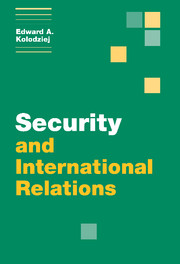Book contents
8 - Whither international security and security studies?
Published online by Cambridge University Press: 04 December 2009
Summary
When someone is honestly 55% right, that's very good and there's no use wrangling. And if someone is 60% right, it's wonderful … But what's to be said about 75% right? Wise people say this is suspicious. Well, and what about 100%? Whoever says he's 100% right is a fanatic …
– an old Jew of GaliciaAfter so extensive a review and evaluation of seven contesting schools of thought, are we ready to crown a clear winner – a hegemon in security studies? Hardly. The winning paradigm or approach would have to meet fully the standards for valid theory and reliable practice defined in chapter 1. None do. Yet in varying degrees, and here the reader is the final judge, all meet a minimum test of Imre Lakatos' notion of a progressive research program.
Each would also have to explain the rise and demise of the Cold War – enough to warrant its inclusion in the struggle for hegemony among contesting security perspectives. In greater or lesser measure, each has some value to add to the mix of explanations for this tectonic shift in international relations and global politics. None comes close to offering a definitive explanation for this global struggle and its passing.
Remember this volume nests security studies within the larger and capacious scope of international relations theory.
- Type
- Chapter
- Information
- Security and International Relations , pp. 307 - 318Publisher: Cambridge University PressPrint publication year: 2005



